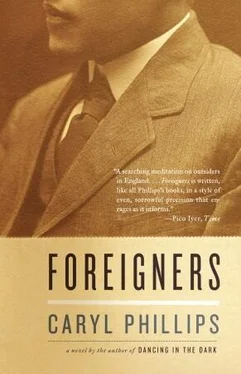After Turpin and Robinson shook hands and posed briefly for photographs, Turpin stripped off his shabby dressing gown and mounted the scales. At 5'11'' and with unusually broad shoulders, he tipped the scales at 159 lb. His opponent, on the other hand, was 5½ lb inside the 160 lb limit. Robinson looked at the Englishman and found it hard to believe that this heavily muscled coloured lad was not at least a light heavyweight. The strapping lad was clearly as strong as an ox and in his autobiography Robinson was to describe his feelings at this moment. 'Right there, Turpin impressed me. His torso was like an oak tree. If he could box even a little bit I was going to be in trouble.' Of course, the British knew that their man could fight a bit. After all, he was the British and European middleweight champion, and he never seemed to worry unduly about who he was going to fight. In fact, this was his greatest asset, his ability to approach every bout as though it was no more or no less difficult than the one before. However, those pressmen who had bothered to visit his camp at Gwrych Castle would have seen how, on this occasion, his training had been geared specifically to cope with Robinson's fast combinations and the most devastating left hook in the business. One training partner in particular had been detailed to throw nothing but Sugar Ray-style left hooks, hard, fast, and non-stop. However, despite Robinson's private ruminations on seeing Turpin stripped to the waist, Sugar Ray knew that he was the champion, he was the draw, and tomorrow his European sojourn would be at an end and he would be counting his money and readying himself to depart back across the Atlantic Ocean in the direction of New York City.
The weigh-in ended with the British Boxing Board of Control doctor verifying that both the champion and the challenger were in a fit state to fight this evening over fifteen rounds for the middleweight championship of the world. For most of the proceedings, Robinson had effortlessly played to the crowd, who clearly adored him. Turpin, by contrast, had stayed quietly in the background enjoying the 'show' as much as anyone else. As the weigh-in concluded, and the Robinson entourage left noisily for a West End hotel, Turpin, his brothers Dick and Jackie, and George Middleton realised that they had a whole afternoon to kill and they were momentarily stumped as to what to do. It was Randolph Turpin who decided that the most important thing would be to get away from the hordes of people, and so he suggested that they all go and watch a film. After all, it would be dark inside the cinema, and nobody would recognise them so they would be able to sit down and unwind in peace.
George Middleton bought four entrance tickets and they all trooped into a West End picture house and took their seats. Within minutes of the feature beginning, Turpin was pushing Jackie and rousing him from his sleep. 'Wake up, Jack. This is a bloody good film!' Jackie tried to stay awake, but the warmth and comfort of the cinema won the battle and soon he was once again fast asleep. Randolph Turpin, however, paid rapt attention and he followed the whole story right down to the film's conclusion. As they stepped out of the cinema and into the light of a beautiful late afternoon in July, George Middleton looked nervously at his watch. It was time. They found their way to the nearest Tube station where George bought four single fares to Earls Court and handed the brothers their tickets. Fight fans who were travelling from work directly to the Exhibition Hall at Earls Court could scarcely believe their eyes when they saw Randolph Turpin, his fight gear in a used carrier bag that was tucked neatly under his arm, riding to the biggest night in British sporting history on the same Tube as them. Whatever the outcome of tonight's fight, this man of the people was already a hero. Should he manage to survive even one or two rounds and put up a decent showing, this would be enough to get the celebratory pints flowing later on in the evening. Few could ever have imagined it, but on this particular night it was a coloured fighter on whom all British hopes were pinned.
British people have always held their prizefighters in high esteem, for their toughness and rugged durability represents, in their eyes, the very best of the British bulldog spirit. Boxing is also a sport which brings together those at either end of the social spectrum, with the bouts generally fought by working-class toughs under the supervision and patronage of blue bloods and aristocrats. For the upper classes, being able to box is a social skill which one often acquires as part of one's education, but actual prizefighting is considered best left to the lower orders. In the early nineteenth century, both the blue bloods and the lower classes came together when an outsider, a black American named Tom Molineaux, was scheduled to fight the British hero Tom Cribb for what would have been regarded the undisputed heavyweight championship of the world. The fight took place in December 1810 at Copthall Common just south of London, and thousands of people poured out of the city and gathered in a field to witness the battle royal . The black American was clearly getting the better of the Englishman, but unable to tolerate the notion of the championship being in the hands of either an American, or a black man, the crowd stormed the ring injuring Molineaux's hands. The fight was eventually restarted, but the 'ebony imposter', as the English had dubbed him, was incapable of defending himself and was eventually defeated. The championship title remained in English hands and the foreign threat was vanquished.
Eighteenth- and nineteenth-century bare-knuckle fighting eventually gave way to 'boxing' in 1867, when twelve rules for the sport were drafted and published under the patronage of John Douglas, the ninth Marquess of Queensberry. Fights were now to be 'a fair stand-up boxing match' in a twenty-four-foot ring, with rounds of three minutes duration and one minute of rest between each round. Padded gloves were to be worn, and there was to be no 'butting or wrestling', and should a man be knocked down he would be allowed ten seconds to get up. The first world title bout under these rules saw the heavyweight 'Gentleman Jim' Corbett defeat John L. Sullivan in 1892 in New Orleans. By the end of the nineteenth century, and on into the twentieth, the odd stout-hearted English fighter aside, American boxers ruled the roost at most weights. Wave after wave of new American immigrant — Italian, Irish, and Jewish — attempted to establish a place in American life by earning some respect in the ring. However, when it came to title shots black boxers were often deliberately left at the back of the line. The charismatic black boxer Jack Johnson, who held the world heavyweight title from 1908 until 1915, did much to stir up hostility and antipathy towards coloured fighters by the outlandish nature of his behaviour. Boastful, arrogant even, with a twinkling eye, a broad grin, and a succession of white women on his arm, Johnson was everything that 'white America' hated. When 'white America' finally won back 'their' heavyweight championship in 1915, they were reluctant to let any other uppity negroes take it away again. In the future their champions would be white, or black and humble, like Joe Louis. Sugar Ray Robinson fell into the category of the humble for, despite all his flash and his panache, he was a charmer who possessed impeccable manners. He was, in short, an acceptable negro, a person who most white Americans were proud and comfortable to see representing them.
In Britain things had been, until two years earlier, somewhat different. A clear colour bar had been in effect so that black boxers were prohibited from fighting for or holding the British title. They were allowed to fight for the British Empire title, but at all weights black boxers, even if they were, like Randolph Turpin, born and bred in Britain, were treated as foreigners and excluded from fighting for their own national championship. After the Second World War there was increasingly vocal opposition to the policy, and in 1947 the racist restriction was lifted. Fittingly, it was Turpin's eldest brother, Dick, who, in June 1948, became Britain's first black boxing champion, lifting the middleweight crown. He lost the title in April 1950, but a few months later, in October 1950, his brother Randy won back the title. However, a national title was not nearly enough to guarantee a lucrative payday. Fight fans tended to rally behind local heroes, and to some extent box offices depended upon a fighter bringing his loyal followers to a bout. Although many people in the Midlands did recognise Randolph Turpin as one of their own, there was no serious box-office support for a coloured fighter no matter how skilled or game he might be. There was no doubt that Turpin was popular and regarded as a man of the people, but the interest of the general public in the Robinson versus Turpin bout was generated by Robinson's presence, and by the David versus Goliath aspect of the clash. The British Boxing Board of Control may have relaxed their rules to accommodate coloured boxers, but the general public had still not fully warmed to the idea of black boxers being also British.
Читать дальше











![Unknown - [Carly Phillips] The Bachelor (The Chandler Brothe(Bookos.org) (1)](/books/174132/unknown-carly-phillips-the-bachelor-the-chandle-thumb.webp)
